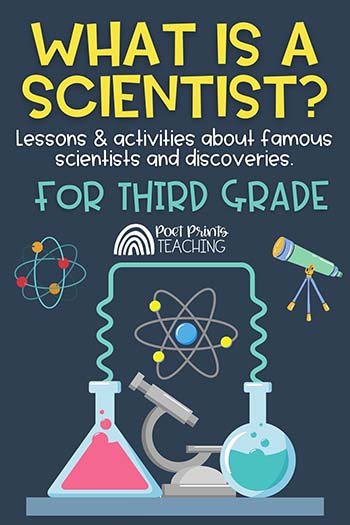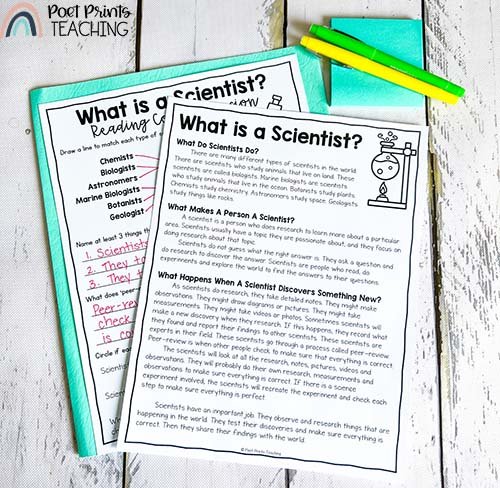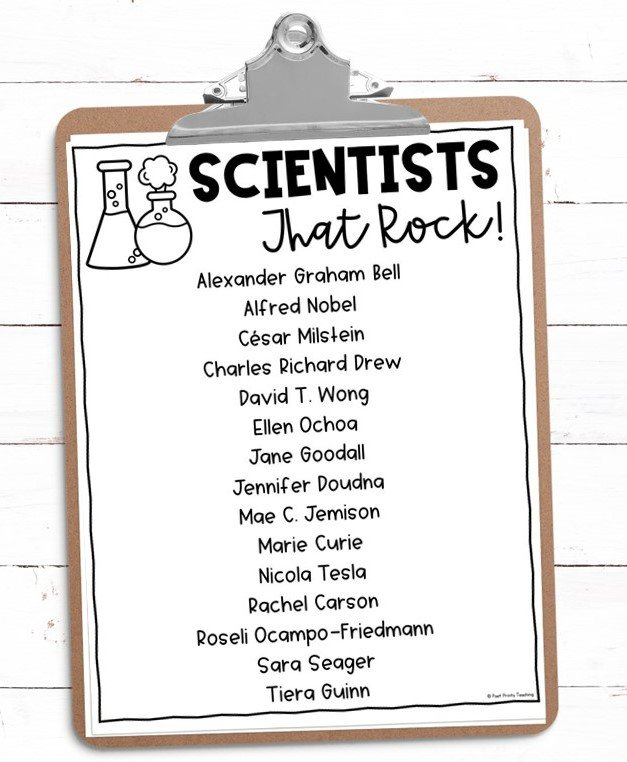What Is a Scientist For Kids
Have you ever stopped to ask yourself or your students “What is a scientist? What characteristics and skills does a scientist need?” It’s an important conversation to have with our students. Why do we need to teach them the qualities of a scientist? All students can be scientists, but what do scientists do? Let’s take a closer look at what a scientist is and how we can create scientists in our classrooms.
in simple words, what is a scientist?
Nonfiction reading: “What is a Scientist?” - available as a free download!
A scientist is a person who conducts research to gain more knowledge in a particular area.
There are scientists in a variety of fields: biology, physics, marine biology, zoology, you name it! Scientists are NOT someone who just “knows” things or “guesses” answers. Scientists research!
why is peer-review so important?
Scientific discoveries and research go through a process called peer-review. This is when other scientists check or recreate the experiments and research that was done. Peer-review is a great way to ensure that the discoveries and research are correct.
Imagine that you conducted an experiment where you roll a ball down the hallway to see the path it takes. Your ball curves towards the left. You determine that all balls curve to the left when they are rolled down hallways.
THIS is where the peer-review process will come in. A group of scientists will try to replicate your findings and poke holes in your method. Eventually, they will see that balls don’t only roll to the left…I think you get the picture.
Scientists play an important role when it comes to discoveries and research. Scientists discovered the concept of gravity, they investigated space, and they invented the internet. Scientists also discover new medications and healthcare technology. Scientists study animal behavior and research the best ways to care for the environment. Scientists are researching and making discoveries on a regular basis. They play an important role in our society.
Ideas for Teaching Students about Scientists
We should be teaching our students what a scientist is, so they don’t have misconceptions moving forward. Learning about scientists is also a great way to expose students to the different careers they could have in STEM fields. Maybe one of our students will make the next greatest scientific discovery when they get older!
So here are some ideas to help teach our students about scientists:
Brainstorm About Scientists
It’s always fun to brainstorm with students about what they already know. A classic KWL (Know, Wonder, Learn) chart is a great way to start. Have students discuss and brainstorm what they already know. Then look up what they think they know to make sure it’s correct. This will help to demonstrate the research and “peer-review” aspect of science!
Research a Scientist
Have students research famous scientists (both from history and current scientists). Each student can do a little research on a specific scientist and create a ‘Scientist Trading Card’ to share with the class. This is such a great way to expose students to the many different people who have made a BIG difference in our world.
Here are some ideas of scientists your students could research:
Isaac Newton
Thomas Edison
Albert Einstein
Marie Curie
Charles Darwin
Stephen Hawking
Rachel Carson
Jane Goodall
Mary Anning
Bill Gates
George Washington Carver
These are just a few names of famous scientists. There are lists upon lists of famous scientists that can be found on the internet, just a short Google Search away.
Build on students’ curiosities
After doing some introductory work about what a scientist is, you can have your students put their new knowledge into practice. This might be a great time to introduce Genius Hour. Have students pick a topic they are interested in and let them research and explore the topic!
Learning about scientists and the characteristics of a scientist might just be a key to helping our students better connect with science. Maybe one of our students will be the next to uncover something amazing in the scientific world!





